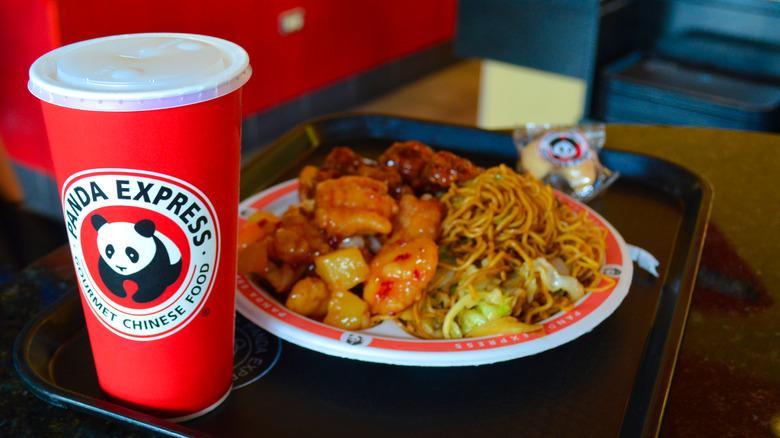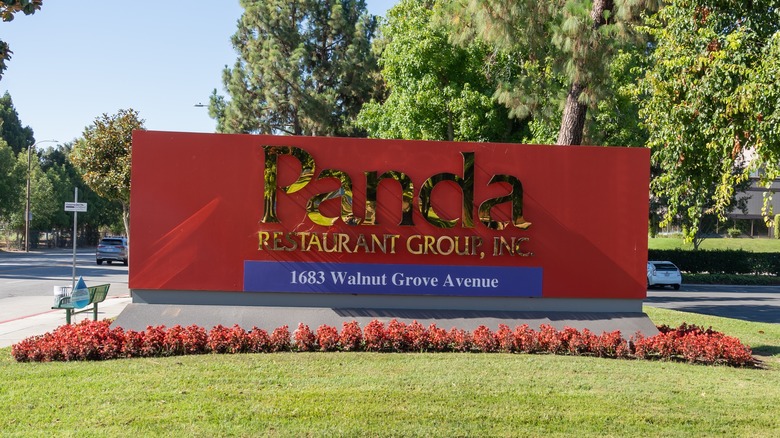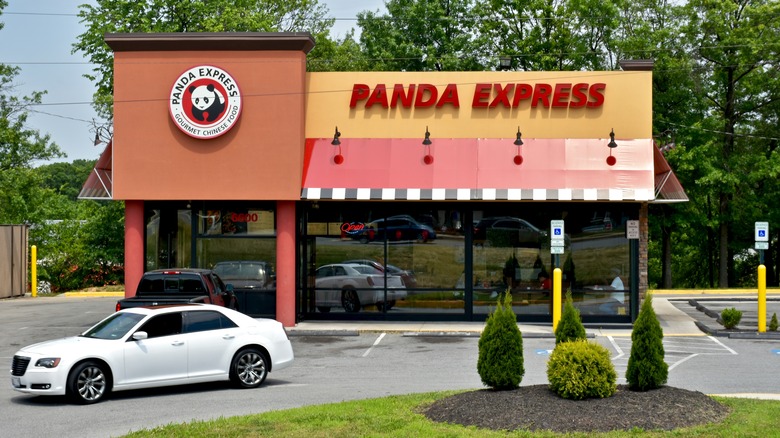The Adorable Name Panda Express First Had
"Panda Express" is already a fairly cute name. Furry black and white bears that laze around and chomp down on bamboo are inherently charming, but the high-speed punctuation of "Express" ends the moniker on a more down-to-business note. The chain once had an even more adorable name, though, without all the hustle and bustle. Just like the quick-service restaurant's fortune cookies, Panda Express has delightful surprises hidden within.
Panda Express is a family-owned business that started circa 1983 in a California mall as a way for married couple Andrew and Peggy Cherng to support their family. Andrew got the operation set up, then Peggy customized the venture's operating systems to make things more efficient. Such speedy service worked well in the on-the-go mall environment. It didn't hurt, either, that in 1987, Panda Express also invented the now-beloved orange chicken. Soon, the business was expanding, including overseas, thanks in large part to drive-thrus and an innovative online ordering system, per Nation's Restaurant News. Thousands of locations now exist. As recently as 2020, its sales were in the billions of dollars. So, if you're looking for American Chinese fast food like Beijing beef, honey walnut shrimp, and wok stir-fry, a Panda Express near you likely has you covered.
Even back in that '83 mall, the brand was known as Panda Express. So, when, where, and how did it get an earlier name? It turns out, Panda Express is a spinoff brand.
Panda Express wasn't Andrew Cherng's first business
Panda Express is a family business in more ways than one. As reported by KCET, Andrew Cherng immigrated to the United States in 1966, later using loans to open a restaurant there with his father Ming-Tsai Cherng, who was a master chef. That establishment, also located in California, was a precursor to Panda Express, serving Chinese food to local Chinese immigrants and others in the area interested in trying the up-and-coming food joint. That place's name? Panda Inn.
Just imagine: This panda has nowhere to rush off to. No, instead, it's come to a cozy house of rest to lounge about throughout its stay. According to NBC, the Cherngs felt this animal served as a symbol of friendship, and Panda Inn was named accordingly. We're sure the food had something to do with it, too, but it's not hard to see why several L.A. culinary institutions gave Panda Inn positive reviews early on.
Word spread. Eventually, one customer, a real estate developer, offered the Cherngs an opportunity to open a quick-service version of Panda Inn at a nearby mall. Andrew jumped at the chance, opening the aptly named Panda Express with his wife. The rest, as they say, is history. Meanwhile, Panda Inn is still open, serving up authentic Chinese food from Mandarin and Szechuan cuisines, as it first did all those decades ago. Both Panda Express and Panda Inn are owned by the same Cherng-led company: Panda Restaurant Group.
Panda Restaurant Group is a family legacy
It can be tempting to dismiss Panda Express as just another fast food option at the mall food court. Clearly, however, the family business that owns this chain has a lot going for it and has made quite an impact on quick-service food. Take orange chicken, for example. As noted by NBC, the dish helped American Chinese cuisine catch on in the States over several decades and is now ubiquitous in this popular category of food. Back in 1987, executive chef Andy Kao helped Panda Express open its first site in Hawaii. There, Kao was taken aback by the importance of citrus and meat in the Aloha State and applied oranges specifically to American bite-sized, boneless, skinless fried chicken along with some spicy, sweet, and tangy sauce reminiscent of Chinese flavor combos. It was a hit, and to this day, Panda Express sells a staggering amount of orange chicken each year.
Panda Express and its culinary creations continue to be a common entry point into Chinese cuisine for many Americans. That doesn't mean Panda is without its flaws, however. Many deride the chain's food as being overly Americanized and the company has faced lawsuits from employees over the years. According to the New York Times, though, the Cherngs ultimately want the business to be about love and family (notably, the Cherngs are still heavily involved in operations). If that's the case, then the friendly, lovable panda does indeed make for a good mascot.


